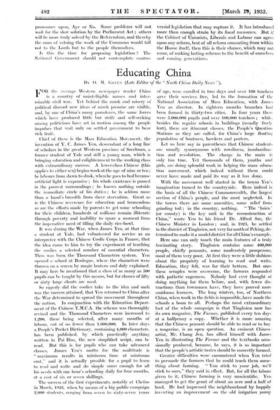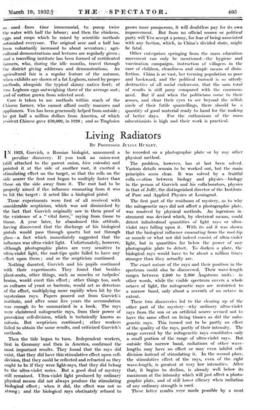Educating China
0. 1.1. GREEN (Late Editor of the "North Ch;!ta Daily News").
1";01t the average Western newspaper reader China is a country of unintelligible names and inter- minable civil war. Yet behind the murk and misery of political discord new ideas of much promise are visible, and, by one of China's many • paradoxes, the same forces hich have produced little but strife and self-seeking among politicians have set in motion among the people impulses that wait only on settled government to bear rich fruit.
Chief of these is the Mass Education Movement, the invention of Y. C. James Yen, descendant of a long line of scholars in the great Western province of Szechuan, former student of Yale and still a young man, which is bringing education and enlightenment to the working class with extraordinary success. A: lower-class Chinese (this
• applies to either sex) begins work at the age of nine or ten; he labours from 'dawn to dusk, when he goes to bed because artificial light is expensive ; his whole existence is passed in the poorest surroundings ; he knows nothing outside the immediate circle of his duties ; he is seldom more than a hand's breadth from sheer starvation. Great as is the Chinese reverence for education and tremendous as are the efforts made by parents to get some schooling for their children, hundreds of millions remain illiterate through poverty and inability to spare a moment from the imperative need of filling the daily rice-bowl.
It was during the War, when James Yen, at that time a student at Yale, had volunteered for service as an interpreter with the Chinese Coolie Corps in France, that the idea came to him to try the experinaent of• teaching the coolies a • selected number of essential characters. Thus was horn the Thousand Characters system. Yen opened a school at Boulogne, where the characters were thrown on a screen by magic lantern and duly explained. It may here be mentioned that a class of as many as 500 pupils can be taught by this means, but for classes of fifty or sixty large charts are used. • -
So eagerly did the coolies take to the idea and such was the success attained, that Yen returned to China after the War determined to spread the movement throughout the nation. In conjunction with the Education Depart- ment of the Chinese YM.C.A. the scheme was thoroughly revised and the Thousand Characters were increased to ,200, these being selected, after many months of labour, out of no fewer than 1;600,000. In later clays a People's Pocket Dictionary, containing 4,000 characters, has been published, by which ptactically anything written in Pai Hua, the new simplified script, can be read. But this is for pupils who can take advanced classes. James Yen'S motto for the multitude is " maximum results in Minimum time at minimum cost," and it is actually possible for a pupil to learn to read and write and do simple sums enough for all his needs with one hour's schooling daily for four months, at a cost of six or seven shillings.'
The success of the first experiinents, notably at Chefoo in March, 1023, when by means of a big public campaign 2.000 students, ranging from seven to sixty-sever' years
of age, Were enrolled in two days and over 100 teachers gave their services free, led to the formation of the National Association of Mass Education, with James Yen as director. In • eighteen months branches, had been formed in thirty-two cities. In four years there were 5,000,000 pupils and' weer 100,000 teachers ; besides the regular schools in buildings (usually freely lent), there arc itinerant classes, the People's Question Stations as they are called, for China's large floating population of boatmen, hawkers and porters.
Let us here say in parentheses that Chinese students are usually synonymous with rowdiness; insubordina-
tion and revolution. The charge in the main is only too true. Yet thousands of them, youths and
girls, are doing splendid work in helping the mass educa- tion movement, which indeed without them could never have made and paid its way as it has &Me.
With the movement well started in the towns, Yen's imagination turned to the countryside. Here Weed._is the basis :of all the Chinese Commonwealth, time :largest section of China's people, and the most neglected. . the towns there are some amenities, some relief from grinding toil ; nnthe country-, nothing. ". The hsien' (or county) is the key unit in the reconstruction of China,". wrote Yen to his friend Dr. Alfred Ste, flit: Chinese Minister in London ; and, in 1925; he settled in the district of Tinghsicn, not very far south of Peking, de- termined to make it a model district for all China's example.
Here one can only touch the main featureS of a truly fascinating story. Tinghsien contains some 400,000 people, chiefly peasants, some moderately prosperous, most of them very poor. At first they were a little dubious about the propriety of learning to read and write. Education, they • felt, was for their betters. But once these scruples were overcome, the farmers responded with pathetic eagerness. Nobody had ever thought of doing anything for them before, and, with fewer dis- tractions than townsmen have, they have proved more aSsiduous learners. The long winters, too, of Northern China, when work in the fields is impossible, have made the schools a boon to all. Perhaps the most extraordinary fact of the whole campaign is that Tinghsien now has its own magazine, *The Farmer, published every ten days at a halfpenny a copy. Whether it is more amazing that the Chinese peasant should be able to read or to buy a magazine, is an open qUestion. An eminent Chinese artist,- Mr. Chang Jen, has allied himself with James Yen • in illustrating The Farmer and the textbooks occa- sionally produced, because, he says, it is so important that the people's artistic tastes should be correetlyforMed.
Greater difficulties were -encountered when Yen tried to persuade the farmers that he could teach them -some- thing about farming. "You stick to your job, • We'll stick to ours,"- they said in effect. But, for all the labour given to it, Chinese farming is very unscientific.-: Yen managed to get the grant of about an acre and• a -half of hand.' 'He had impressed the neighbourhood by happily inventing an improvement on the old irrigation pump as used -from time immemorial, to pump twice the water with half the labour; and then the chickens, eggs and. crops which he raised by scientific methods astonished- everyone. The original aere and a half has been !voluntarily increased to about seventeen ; agri- cultural, demonstrations and lectures are regularly given ; and a travelling institute has been formed of certificated farmers, who, during the idle months, travel through the district giving addresses and demonstrations. An agricultural fair is a regular feature of the autumn, when exhibits arc shown of a fat Leghorn, raised by proper methods, alongside the typical skinny_ native fowl; of two Leghorn eggs outweighing .three of the average sort; and of cotton grown from selected seed.
Care is taken to use methods within reach of the Chinese farmer, who cannot afford costly manures and appliances. Yen has been generously helped from outside ; he got half a million dollars froth America, of which resident Chinese gave $50;000, in 1928 ; and as Tinglisien grows more prosperous, it will doubtless pay for its own improvement. But from no official source or political party will Yen accept a penny, for fear of being associated with any faction, which, in China's divided state, might be fatal.
Other enterprises springing from the mass education movement can only be mentioned—the hygiene and vaccination campaigns, instruction of villagers in the care of children, cleanliness and simple means of disin- fection. China is so vast, her teeming population so poor and backward, and the political turmoil is so utterly destructive of all social endeavour, that the suns total of results is still puny compared with the enormous need. But if and when the politicians come to their senses, and clear their eyes to see beyond the selfish circle of their futile quarrellings, there should be a quantity of good material ready to hand for the making of better days. For the enthusiasm of the mass educationists is high and their work is practical.







































 Previous page
Previous page